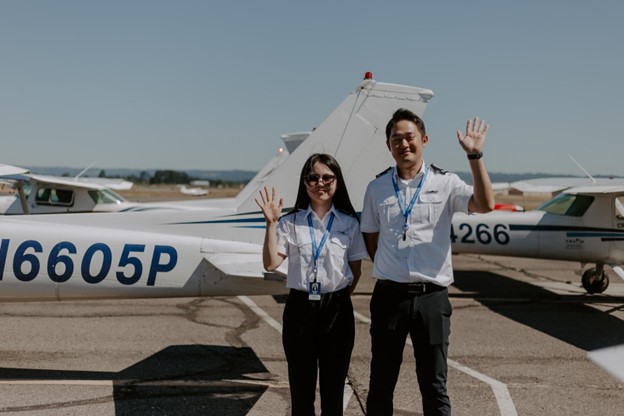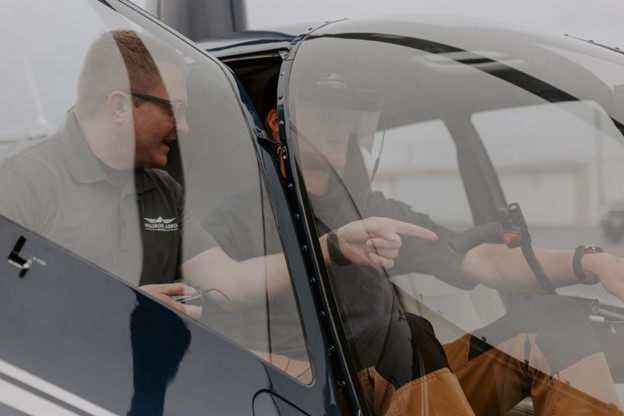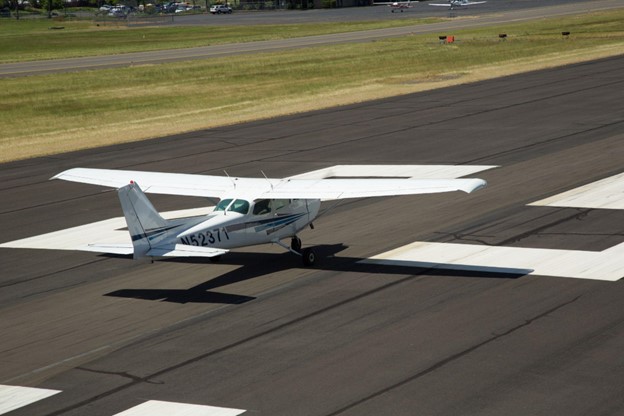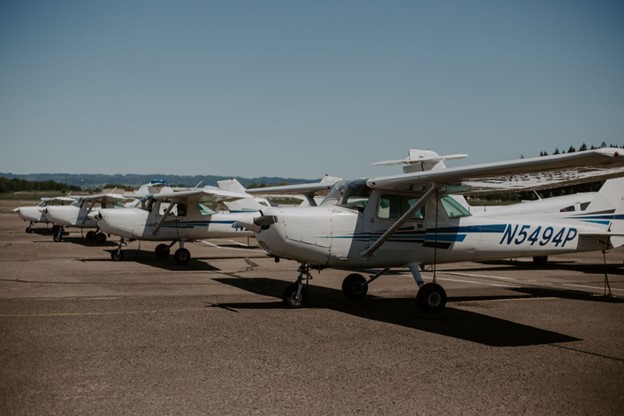As you gather information about how to begin your flight training, we want to help you understand the differences between attending a flight school with its own flight instructor employees versus hiring an independent flight instructor for your training.
During your research, you may have seen that some people select a Part 141 flight school for their training while others choose a different route by hiring an independent flight instructor and doing their training Part 61. There are some important differences between these two paths that you should be aware of when deciding on your flight training and how to best achieve your goal of becoming a professional pilot.
Flight training will be the biggest investment in your future career. As you move through your training, you will be given the knowledge and skills to complete everything from your Private Pilot Certificate to your Commercial Pilot Certificate with the opportunity of becoming a flight instructor.
We hope as you read this post it can help you better understand the difference between completing your training with a Part 141 flight school versus hiring an independent flight instructor.

To start off, let's quickly cover three main questions that are necessary to understand before you begin flight training.
What is an independent flight instructor?
Flight Instructors are pilots that have completed extensive flight training and hold a FAA Certified Flight Instructor Rating. Independent flight instructors are individuals who often don't work for a flight school, but can be hired to give instruction under Part 61.
What is a flight school?
A flight school is a flight training center that provides instruction to aspiring pilots on aircraft operations. Flight schools range from being smaller organizations to larger flight schools and flight universities, and they can offer training under Part 141 or Part 61. Most larger flight schools and university programs are Part 141 approved which means they are held to a higher standard by the FAA.
What is the difference between Part 141 and Part 61?
Part 141 and Part 61 are two different ways to approach your training. Both FAR Part 61 and Part 141 training demand the same minimum standards for you to get your pilot certificate, but FAR Part 141 is more methodical and refined in its approach to helicopter flight lessons.
Flight instructors approved by the FAA can train you under FAR Part 61 anywhere—whether they’re attached to a flight school or not—and they can follow their own method.
FAR Part 141 training is given through approved flight schools, like Hillsboro Aero Academy, who have had our course curriculums reviewed and approved by the FAA. This means we’ve perfected our courses over time, found the best path for your training and we stick to it.
Now let’s look at the difference between flight training with an independent flight instructor and training at a flight school.

Independent Flight Instructor Considerations
Flight Training Structure
Hiring an independent flight instructor will allow you to move at your own pace on a timeline that works for your schedule and allows you to meet your goals. You will schedule flight lessons directly with the instructor which gives you more control over the pace of training.
Independent flight instructors have received the training and certification from the FAA to instruct new pilots so they will be able to teach you the skills and maneuvers needed for your training. Outside of flight instruction, your instructor will recommend online self-study tools to support your learning while you study for the FAA Airman Knowledge written test which is taken once you have met the FAA requirements. The ground portion will be left to you to self-pace with materials found online and recommended books. If you are need more assistance, you can hire your flight instructor at an extra cost for some individual ground instruction.
This type of flight training with an independent flight instructor is conducted under Part 61 of FAA regulations. This is less structured, and the FAA does not have requirements on what type of tasks or maneuvers are done at specific points in your training as long as the training requirements are met and your instructor is comfortable signing off on your readiness to take the FAA examination.
Flight Instructor Availability
You must coordinate with your flight instructor to determine availability for your flight lessons, and consider both of your schedules when developing your training plan. The availability of your flight instructor and the number of scheduled flight lessons will drive the pace and duration of your flight training. This flexibility of scheduling is important for many students who have other obligations either with work or family. However, if there is not a consistent schedule for training with regular weekly flights, it can take longer to achieve proficiency in the necessary skills.
When contacting an independent flight instructor, it would be good to raise the question of how many flights they can do in a week and the average completion time to the Commercial Pilot Certificate and CFI ratings to ensure this timeline fits with your goals.
Aircraft Availability
Often times independent flight instructors operate their own aircraft. As you progress through your flight training, you’ll find that aircraft availability is an important factor in maintaining a consistent schedule.
Other factors that are important to consider regarding aircraft are how much down time will there be due to maintenance and are there other aircraft available to fly. Being limited to one aircraft can cause delays in your training which can be longer if there is no on-site maintenance. It's also important to consider the availability of aircraft fuel relative to where the aircraft is based and how many other people are flying this aircraft so you have a clear picture of its availability.
Payment Structure
Independent flight instructors can be hired from flight instructor websites or at smaller airports/FBOs. If you are seeking an independent flight instructor, make sure to check their hourly rates as they differ between instructors and between services provided, whether its flight or ground instruction. In most cases these fees are paid up front to your instructor prior to the lesson taking place. There are not options for financing your training with an independent flight instructor.

Flight School Considerations
Flight Training Structure
Many flight schools operate under Part 141 and follow an FAA-approved syllabus that guides you through the knowledge and skills necessary to be a professional pilot. If your goal is to fly for an airline or another commercial operation, the structure of a Part 141 flight school will provide you with advantages as its designed to meet the high standards required for commercial operations.
Most flight schools structure their courses to provide ground and flight lessons that work in tandem to provide the training you need to ensure proficiency. The skills you learn in your ground class will be practiced in the air. Learning in this method helps improve retention and allows students to better understand complex concepts.
At HAA, we offer our students a group ground class structure. Our group ground classes begin monthly, and you will be assigned to a class depending on your start date. Your ground class will be taught by one of our approved ground instructors and take place usually five days per week to keep pace with the training schedule. These scheduled ground classes allow you to obtain the required ground hours per Part 141 requirements. Your ground instructors are trained to provide extensive ground knowledge to help you better prepare yourself for the FAA written exam.
In addition to your ground instructor, you will also be assigned a flight Instructor. Your flight instructor will be the person to instruct you during your flight lessons and teach you various maneuvers, skills, and necessary aircraft pre-flight checks. These lessons can include flight lessons, simulator lessons, and one-on-one briefings post flight. Your fight Instructor will be your primary contact during training. They will also support you to keep up with the five scheduled activities per week, which is what we recommend in order to complete the program most efficiently.
Aircraft Availability
One factor that allows for steady flight training is the availability of aircraft you're using during the training program. As we mentioned above, being dependent on one aircraft during your entire flight training can create obstacles in regards to your training timeline. It's also valuable to get experience on different aircraft models during your training. At HAA, we maintain a large airplane fleet of Cessna 152s, Cessna 172s, and Piper Seminoles at our Hillsboro and Redmond campuses. At our Troutdale Campus, we maintain a helicopter fleet of R22s and R44s.
Our flight school fleet is maintained by our on-site maintenance facility, an FAA Part 145 Repair Station, ensuring consistent aircraft availability to keep our students flying. In the event of any need for maintenance, our on-site team will be able to assist with everything from minor issues during preflight to 100-hour maintenance checks ensuring all aircraft meet safety requirements.

Financing
For aspiring pilots, the cost of flight training can be a challenge to overcome. Many flight schools require students to pay a portion of their tuition upfront before training can begin. At Hillsboro Aero Academy, we recognize this barrier and work to minimize it by offering a pay-as-you-go program and multiple financing options. We require no upfront deposit; students pay at the completion of each flight lesson. At HAA, we work hard to make that cost burden easier, from flexible payment structures to special financing options. The only portion paid up front is for ground school which is paid in advance of starting each new ground course.
HAA has financing options through our partners Meritize and College Ave Student Loans which are available to those who qualify. We also partner with Alaska Airlines and Horizon Air on the Ascend Pilot Academy and the Horizon Air Pilot Development Program which provides funding for training to those accepted into these programs.
HAA was also recently approved by the US Department of Education as a Title IV eligible institution. Benefits of being Title IV eligible include students having the ability to use their 529 plans for training and being able to deduct a portion of your flight training expenses from your taxes, as well as having the potential to defer previous federal loans as a current student at our flight school.
Visit our financing webpage to get more information on the available programs.
Pilot Community
It’s no secret that the aviation industry is large and growing, but those who are a part of it still manage to feel connected. Joining a flight school provides you with the opportunity to become part of the pilot community at that school so you can share experiences, knowledge, and offer support to one another. You are training alongside peers that have the same dream and passion as you.
Meeting and networking with not only your student peers, but your flight instructor, other flight instructors, training chiefs, line service employees, mechanics, and flight school faculty will allow you to create valuable relationships and connections in the industry that could last your entire career.
In addition to building friendships in a pilot community, what's better than hangouts in the hangar when you want to have a break from studying? At Hillsboro Aero Academy, we have monthly events, including BBQs, game nights, potluck lunches, movie nights, and our yearly Summer Bash so there are lots of opportunities to connect with our community at HAA.

We hope this post clarified different the differences between flight training with an independent flight instructor versus joining a flight school.
If you have any questions or would like more information regarding flight training at Hillsboro Aero Academy, our admissions team is happy to schedule a phone call or in-person tour with you. You can contact us to schedule at 1.503.726.3000 or info@flyhaa.com. We’re excited to help you take your first step toward becoming a professional pilot today.

